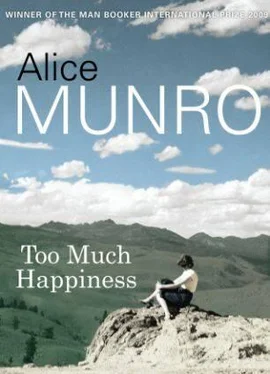And spoken so gently and respectfully, yet with light-years’ condescension.
Did I believe what Sylvia had said?
I believed it was what he had told her.
I did see Roxanne again that day. I saw her at the very time that Sylvia was talking to me and introducing to me this new name. Mrs. Hoy.
She-Roxanne-was in her car and she had stopped at the first cross street at the bottom of Croziers’ Hill to watch us drive by. I didn’t turn to look at her because it was all too confusing, with Sylvia talking to me.
Of course Sylvia would not know whose car that was. She wouldn’t know that Roxanne must have come back to get an idea of what was going on. Or that maybe she had kept driving around the block-could she have done that?-all the time since she had left the Croziers’ house.
Roxanne would recognize Sylvia’s car, probably. She would notice me. She would know that things must be all right, from the kindly, serious, faintly smiling way that Sylvia was talking to me.
She didn’t turn the corner and drive back up the hill to the Croziers’ house. Oh no. She drove across the street-I watched in the rearview mirror-towards the east part of town where the wartime houses had been put up. That was where she lived.
“Feel the breeze,” said Sylvia. “Maybe those clouds are going to bring us rain.”
The clouds were high and white, glaring; they looked nothing like rain clouds; and the breeze was because we were in a moving car with the windows rolled down.
· · ·
I understood pretty well the winning and losing that had taken place, between Sylvia and Roxanne, but it was strange to think of the almost obliterated prize, Mr. Crozier-and to think that he could have had the will to make a decision, even to deprive himself, so late in his life. The carnality at death’s door-or the true love, for that matter-were things I had to shake off with shivers down my spine.
Sylvia took Mr. Crozier away to a rented cottage on the lake, where he died sometime before the leaves were off.
The Hoy family moved on, as mechanics’ families often did.
My mother struggled with a crippling disease, which put an end to all her moneymaking dreams.
Dorothy Crozier had a stroke, but recovered, and famously bought Halloween candy for the children whose older brothers and sisters she had ordered from her door.
I grew up, and old.
I suppose there was talk in our house, afterwards.
How sad, how awful . (My mother.)
There should have been supervision. Where were the counsellors? (My father.)
It is possible that if we ever passed the yellow house my mother said, “Remember? Remember you used to be so scared of her? The poor thing.”
My mother had a habit of hanging on to-even treasuring-the foibles of my distant infantile state.
Every year, when you’re a child, you become a different person. Generally it’s in the fall, when you reenter school, take your place in a higher grade, leave behind the muddle and lethargy of the summer vacation. That’s when you register the change most sharply. Afterwards you are not sure of the month or year but the changes go on, just the same. For a long while the past drops away from you easily and it would seem automatically, properly. Its scenes don’t vanish so much as become irrelevant. And then there’s a switchback, what’s been all over and done with sprouting up fresh, wanting attention, even wanting you to do something about it, though it’s plain there is not on this earth a thing to be done.
Marlene and Charlene. People thought we must be twins. There was a fashion in those days for naming twins in rhyme. Bonnie and Connie. Ronald and Donald. And then of course we-Charlene and I-had matching hats. Coolie hats, they were called, wide shallow cones of woven straw with some sort of tie or elastic under the chin. They became familiar later on in the century, from television shots of the war in Vietnam. Men on bicycles riding along a street in Saigon would be wearing them, or women walking in the road against the background of a bombed village.
It was possible at that time-I mean the time when Charlene and I were at camp-to say coolie , without a thought of offense. Or darkie , or to talk about jewing a price down. I was in my teens, I think, before I ever related that verb to the noun.
So we had those names and those hats, and at the first roll call the counsellor-the jolly one we liked, Mavis, though we didn’t like her as well as the pretty one, Pauline-pointed at us and called out, “Hey. Twins,” and went on calling out other names before we had time to deny it.
Even before that we must have noticed the hats and approved of each other. Otherwise one or both of us would have pulled off those brand-new articles, and been ready to shove them under our cots, declaring that our mothers had made us wear them and we hated them, and so on.
I may have approved of Charlene, but I was not sure how to make friends with her. Girls nine or ten years old-that was the general range of this crop, though there were a few a bit older-do not pick friends or pair off as easily as girls do at six or seven. I simply followed some other girls from my town-none of them my particular friends-to one of the cabins where there were some unclaimed cots, and dumped my things on top of the brown blanket. Then I heard a voice behind me say, “Could I please be next to my twin sister?”
It was Charlene, speaking to somebody I didn’t know. The dormitory cabin held perhaps two dozen girls. The girl she had spoken to said, “Sure,” and moved along.
Charlene had used a special voice. Ingratiating, teasing, self-mocking, and with a seductive merriment in it, like a trill of bells. It was evident right away that she had more confidence than I did. And not simply confidence that the other girl would move, and not say sturdily, “I got here first.” (Or-if she was a roughly brought-up sort of girl-and some were, having their way paid by the Lions Club or the church and not by their parents-she might have said, “Go poop your pants, I’m not moving.”) No. Charlene had confidence that anybody would want to do as she asked, not just agree to do it. With me too she had taken a chance, for could I not have said, “I don’t want to be twins,” and turned back to sort my things. But of course I didn’t. I felt flattered, as she had expected, and I watched her dump out the contents of her suitcase with such an air of celebration that some things fell on the floor.
All I could think of to say was, “You got a tan already.”
“I always tan easy,” she said.
The first of our differences. We applied ourselves to learning them. She tanned, I freckled. We both had brown hair but hers was darker. Hers was wavy, mine bushy. I was half an inch taller, she had thicker wrists and ankles. Her eyes had more green in them, mine more blue. We did not grow tired of inspecting and tabulating even the moles or notable freckles on our backs, length of our second toes (mine longer than the first toe, hers shorter). Or of recounting all the illnesses or accidents that had befallen us so far, as well as the repairs or removals performed on our bodies. Both of us had had our tonsils out-a usual precaution in those days-and both of us had had measles and whooping cough but not mumps. I had had an eyetooth pulled because it was growing in over my other teeth and she had a thumbnail with an imperfect half-moon, because her thumb had been slammed under a window.
And once we had the peculiarities and history of our bodies in place we went on to the stories-the dramas or near dramas or distinctions-of our families. She was the youngest and the only girl in her family and I was an only child. I had an aunt who had died of polio in high school and she-Charlene-had an older brother who was in the Navy. For it was wartime, and at the campfire sing-song we would choose “There’ll Always Be an England” and “Hearts of Oak,” and “Rule Britannia,” and sometimes “The Maple Leaf Forever.” Bombing raids and battles and sinking ships were the constant, though distant, backdrop of our lives. And once in a while there was a near strike, frightening but solemn and exhilarating, as when a boy from our town or our street would be killed, and the house where he had lived, without having any special wreath or black drapery on it, seemed nevertheless to have a special weight inside it, a destiny fulfilled and dragging it down. Though there was nothing special inside it at all, maybe just a car that didn’t belong there parked at the curb, showing that some relatives or a minister had come to sit with the bereaved family.
Читать дальше












